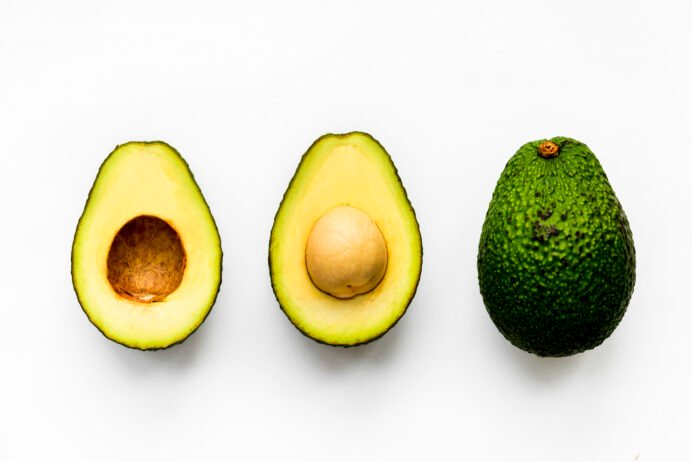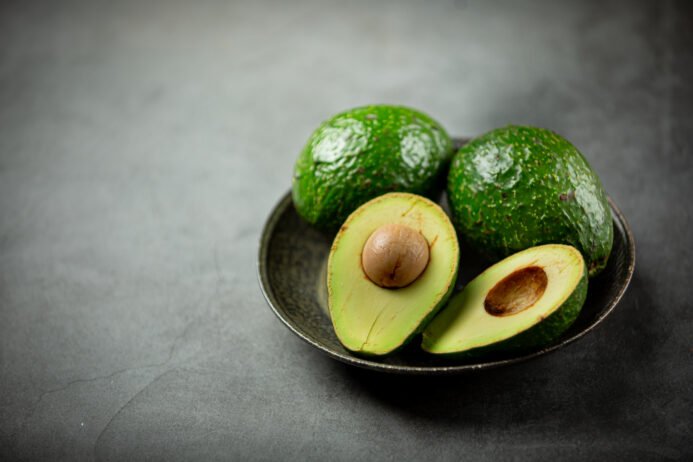Avocado is more than just a creamy toast topping or guacamole staple. In recent years, science has begun to reveal how this “super fruit” exerts unique effects on two of our most vital systems: the gut and the cardiovascular system. On National Avocado Day 2025, here are five compelling facts that show why avocado deserves serious attention in your diet—especially for your gut and heart.
1. Avocados Boost Microbial Diversity and Favor Beneficial Gut Bacteria
- n a 26-week randomized trial (the HAT trial), participants consuming one avocado per day experienced a higher α-diversity of gut microbiota compared to control (habitual diet) participants—a strong marker of gut health.
- Certain beneficial bacteria such as Faecalibacterium prausnitzii and “Bacterium AF16_15” increased in abundance in the avocado group, indicating a selective enrichment of helpful microbial species.
- Earlier, a 12-week controlled study also showed that including avocado in a daily meal increased the abundance of fiber-degrading bacteria, increased short-chain fatty acid (SCFA) concentrations, and reduced bile acid levels in feces.
Why this matters: A diverse gut microbiome is associated with resiliency, better digestion, lower inflammation, and improved metabolic health. By fostering microbes that ferment fiber (to produce SCFAs) and by modulating bile acids, avocados can help maintain gut equilibrium.


2. Avocados Modulate Bile Acids and Lower Fat Absorption
- In the 12-week feeding trial, avocado consumers had reduced fecal bile acid concentrations—notably cholic and chenodeoxycholic acids—compared to the control group.
- Interestingly, despite a slightly higher fat intake, participants in the avocado group excreted more fat in their stool, implying less net absorption of dietary fat.
- The proposed mechanism: soluble fiber and monounsaturated fats in avocado may bind bile acids or alter bile metabolism, altering fat emulsification and absorption dynamics.
Why this matters: Bile acids, when in excess, can be damaging to the intestinal lining or promote dysbiosis. Regulating bile acid metabolism helps protect gut health. Also, moderating fat absorption without energy restriction may support weight balance over time.
3. Avocado Intake Is Linked to Lower Cardiovascular Disease (CVD) Risk
- A large prospective observational study spanning 30+ years (involving over 68,000 women and 41,000 men) found that eating two or more servings of avocado per week was associated with a 16% lower risk of cardiovascular disease and 21% lower risk of coronary heart disease compared to those who consumed avocados rarely or not at all.
- Substituting avocado for saturated-fat–rich foods (like butter, cheese, processed meats) further improved cardiovascular risk profiles in that same analysis.
- A meta-analysis of randomized controlled trials showed that an “avocado diet” tends to reduce LDL (bad cholesterol) and total cholesterol, although effects on triglycerides and fasting glucose were inconsistent.
Why this matters: The heart benefits of avocado likely stem from its monounsaturated fat content, its effect on lipid profiles, and its potential to reduce systemic inflammation and oxidative stress (via gut-mediated pathways).


4. The Monounsaturated Fat + Fiber Combo Makes It Unique
- Avocados are rich in monounsaturated fatty acids (MUFA)—especially oleic acid—which are known to improve lipid profiles (lower LDL and sometimes raise HDL).
- In many studies, the combination of MUFA + dietary fiber works better than either alone, because fiber slows absorption of fats, modulates glycemic response, and feeds gut microbes.
- A review estimates that replacing 1% of energy from carbohydrates with MUFA can reduce LDL by ≈0.8 mg/dL, triglycerides by ≈1.7 mg/dL, and increase HDL modestly.
Why this matters: The synergy between healthy fat and fiber in avocado makes it more than just a fat source—it’s a functional food that supports nutrient absorption, satiety, and metabolic health.
5. New Evidence Suggests Ancillary Benefits (Sleep, Diet Quality) That Feed into Heart & Gut Health
- In the same 26-week HAT trial, participants consuming one avocado daily also reported improved sleep duration compared to those with minimal avocado intake, though the primary cardiovascular health score (AHA’s Life’s Essential 8) didn’t change significantly in that timeframe.
- Better sleep itself is closely tied to cardiovascular health, metabolic regulation, inflammation control, and even gut barrier integrity.
- Avocado consumption also improved overall diet quality scores, suggesting that including avocado may promote a healthier eating pattern overall, beyond its direct effects.
Why this matters: Heart and gut health are not determined by food alone, but by a constellation of lifestyle factors. Avocado’s influence on sleep quality and diet quality gives it added leverage as a piece of the holistic health puzzle.
Tips to Celebrate Avocado Day for Your Gut & Heart
- Try replacing a saturated-fat spread (butter, margarine) with mashed avocado on toast or in a sandwich.
- Add avocado slices to your salads, wraps, or grain bowls.
- Use part avocado in smoothies (creaminess + fiber), or make an avocado-centric dip (with herbs, citrus, yogurt).
- Be mindful of portions—while nutrient-rich, avocados are calorie-dense. Balance with other whole foods.
- Pair avocado with probiotic-rich foods (like yogurt, kefir, kimchi) to potentially amplify gut benefits.
summary
Avocados are digging deeper than just being “healthy fats.” They act as a prebiotic-like food, modulate bile metabolism, and favor beneficial bacterial populations; these gut-level effects converge with favorable lipid changes, reduced cardiovascular risk, and even improvements in sleep and diet patterns. On National Avocado Day 2025, let’s toast (with avocado) to a fruit that may just be one of the few that bridges gut and heart health in a truly meaningful way.


